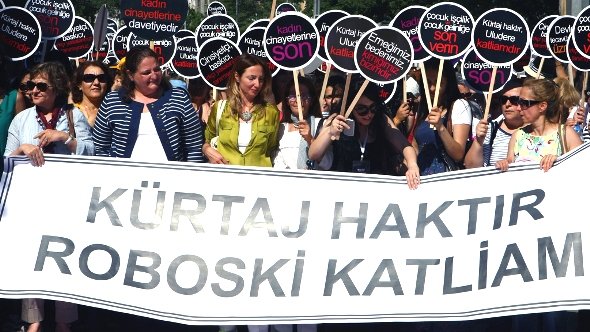''The Government Is Trying to Intrude in People's Private Lives''
The Turkish government kept the abortion debate going for nearly a month. What lessons were learned from this process?
Selen Lermioğlu Yılmaz: In fact we have been learning the lesson for a long time; during the abortion debate it crystallised. The government is doing its best to minimise – even eradicate – people's private lives. The process towards this goal has been accelerated. The attempt to limit abortions should be evaluated together with other interventions: governmental pressure to have at least three children, limiting caesarean sections, the Supreme Court of Appeal ruling that describes anal and oral sex as unnatural, Internet restrictions…

All of them are reflections of a social engineering project targeting private life. But when the abortion discussions began, a large segment of society – even if they were against abortion – discovered that there is an attempt here to constrain people's private lives. Many people realized that this social engineering could touch everybody's life at some point. This is the first lesson.
Secondly diversification in the women's movement in Turkey is increasing. We don't have to agree on everything of course, but we have to act in solidarity. During the abortion discussions we were able to show this solidarity, despite some disagreements. But we also learned that we have to be pro-active. Until now the government had been trying to do something and we were opposing it. The abortion process showed us that we have to develop our own policies and bring our demands to the agenda.
Are you satisfied by the solidarity amongst religious women?
Yılmaz: Yes, I can say as much. They were able to say, "I am personally against abortion but trying to limit access to it or prohibiting it is a form of oppression and undemocratic.. It is true that we were not at the same demonstration, but we were able to act in solidarity.
Until now, since the legalization of abortion there had been no fierce discussions on the issue. There was sort of a tacit agreement between those who did and did not support it. The government may have abandoned its plan for the time being, but the genie is out of the bottle – how will this affect daily life?
Yılmaz: The government told society "abortion is murder", and that what they were trying to do was the right thing. The government is making an attempt at social engineering. They had a similar attitude when trying to define adultery as a punishable act – also a move they later abandoned, but they still gave a message to society. Women were thinking, "I don't have three children, am I doing the right thing?" They feel the pressure.
From now on women will hesitate to talk to doctors about abortion and will feel even more pressure. Even if there will be no new legal arrangements, the discussions will continue in black-and-white terms. This will increase tension in society in the long run and will create new pressures on women.

In addition, by interfering with the implementation the government – even if it is not changing the laws – is affecting daily life. For example, the number of mother-baby health centres was reduced, but these centres were helping women with birth control. In these places women were able to speak about their private problems with people that they trust – but now women are increasingly isolated.
Prime Minister Recep Tayyip Erdoğan said abortion and caesarean section births are part of a "hidden" plot to reduce Turkey's population – the driving force of the economy, according to him. What do you think about it?
Yılmaz: We think some people are giving reports to the prime minister to the effect that the population is aging, and that if this development continues Turkey will be unable to sustain its social security system. But which country has successfully tackled the problem of an aging population by excluding women from working life and forcing them to have at least three children? Only 28 per cent of Turkish women work. In addition, immigration would also solve the problem. Thus only one explanation remains; a nationalistic one – the Kurdish-Turkish population balance in Turkey.
According to this "Kurdish-Turkish population balance" the population growth rate of Kurds is bigger than that of Turks… Actually, this is never spoken about openly, but some theories suggest that this is why the government is trying to increase the population.
Yılmaz: We have some suspicions, too. Perhaps this is the message they are trying to give. The other option is that they are trying to impose their own religious and moral perspective on everyone – because, seriously, the economic explanation is not realistic.
Prime Minister Erdoğan linked the Uludere and abortion issues. In June, 34 Kurdish smugglers from Uludere were killed by near the Iraqi border after the Turkish military mistook them for Kurdistan Workers' Party members. Erdoğan openly said, "Every abortion is an Uludere." What's his motivation behind a statement like this?
Yılmaz: There could be two explanations. Either he said it spontaneously – which would not contradict his personality – or it was a very clever act of political strategy, because these words diverted society's attention as well as dividing the opposition.

By mentioning the embryo and Kurds in the same sentence, he underlined a nationalistic discourse.
How do you assess the reaction of the opposition?
Yılmaz: Their reaction was not good enough. They were unable to say, "This is intervening in private life." The Nationalist Movement Party (MHP) and the Republican People's Party (CHP) preferred to give their reactions via some women MPs, but there were no official statements from parties or parliamentary groups. Maybe they were unable to develop a unified stand on the issue; maybe they thought about their votes.
As for the pro-Kurdish Peace and Democracy Party (BDP), they underlined the aspect of the discrimination of Kurds in the discussion. We as the women movement, in my opinion, were not able to give a strong reaction to Uludere, while the BDP was unable to give a strong reaction to the abortion discussion.
What do you think about the current regulations on abortion?
Yılmaz: First of all, they require the permission of the husband, which might endanger women's lives. A case might involve rape within the family; or maybe the father is not the husband. The limit is 10 weeks, but we say it should be at least 12. Look, there is a new system that is trying to follow every woman from the moment that she gets a pregnancy test and see if the result is positive. This is already putting pressure on women and is unacceptable. This is just another example of interference in peoples' private lives.
Interview conducted by Fatma Kayabal
© Qantara.de 2012
Editor: Lewis Gropp/Qantara.de
Selen Lermioğlu Yılmaz, born in 1972, is the General Coordinator of KA-DER (The Association for Support and Training of Women Candidates). Yılmaz has initiated and prepared several projects, mostly on Women's Rights, Empowerment, Gender, Economic Development, Human Rights and Democracy, Peace and Peace Education for various organizations, to be offered to funders such as the EU, World Bank, and others.
